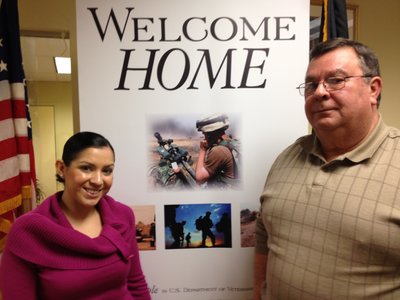“If you have been to war, it sticks with you forever,” said David Cathcart last week. A veteran of the Vietnam War with the 173rd Airborne, Cathcart knows from experience what it is like to go to battle and face challenges upon return. He provides individual counseling to veterans returning from war at a local Vet Center located on Meadowlands Parkway in Secaucus.
“It doesn’t matter what background you are from. Somebody is shooting at you and it is going to change you [and] it is up to us to make sure that those changes don’t remain permanent,” he said.
Part of Veterans Affairs, the Vet Center program was established in 1979 to provide free and confidential readjustment services to veterans and their families. The Secaucus Vet Center had over 4,000 visits last year between family and individual counseling sessions combined.
A need for services
“There was nothing when these [veterans] came out. There was nothing from World War I on,” said Cathcart. “Vietnam veterans…were spit on. They were called names unjustified. That is part of what motivated me to do this. To see where I could help and if I could help correct the image they have been stereotyped with, which is completely unfair.”
When Cathcart returned from Vietnam, he spent three and half years in the hospital recovering from gunshot wounds. “I was shot and blown up, to be honest with you,” said Cathcart.
After his recovery he pursued a career in business but remained involved in veterans’ affairs. It was his motivation to change societal perceptions of veterans that drove him to pursue a master’s degree in mental health counseling and addiction at the age of 50. He has spent the last 12 years in his role as a counselor at the Vet Center treating combat trauma.
“A simple smell can trigger those intrusive memories and make you think back to what happened.” – David Cathcart
__________
Effects of combat
“What we call combat trauma was called ‘soldier’s heart’ in World War II,” said Cathcart.
World War II veterans did not have access to counseling when they returned from war, but Cathcart said that he has World War II veterans on his current caseload.
For North Korea and Vietnam, the term “combat fatigue” was used.
In the early 1980s, the diagnosis came out for post traumatic stress disorder (PTSD). PTSD is a mental health condition that occurs after someone has gone through a traumatic event such as a disaster, war, or an assault. Symptoms of PTSD can manifest as nightmares, flashbacks, difficulty sleeping, and sensitivity to loud noises. PTSD occurs in about 11 to 20 percent of veterans of the Iraq and Afghanistan wars, according to the federal Veterans Administration.
“A simple smell can trigger those intrusive memories and make you think back to what happened. And it never fully goes away,” said Cathcart. “Some people get injured so severely that they need to write down everything to remember anything.”
He explained that what a soldier goes through in combat can be horrifying, but it becomes normal for them. The Vet Center uses Cognitive Behavioral Therapy or behavior modification to help veterans readjust to society.
“Don’t tell them to get over it,” he said. “It is the worst thing you can ever do. It is a horrible experience. That doesn’t mean that everybody who goes to war has the same experience.”
He said that parents, for example, may not understand the changes their son or daughter is going through when they return from war. He said the best approach is to provide the veteran with information about a local vet center but not to press, because it will drive them away from seeking counseling.
The Vet Center also provides direct services to families and will provide individual counseling for children as well as group therapy sessions to help with readjustment or separation anxiety. Group sessions can also include yoga and Tai Chi.
The center also has a survivors’ guilt group for veterans.
Cathcart said the counselors make referrals for medication, physicals, or medical screenings.
Changing face of war
Cathcart cited several trends in clientele.
He said that the center has been treating more females. “With this new cohort you have young ladies that are up manning 50 calibers and getting in shootouts,” said Cathcart. “They are driving trucks…flying helicopters [and] Jet Fighters. They are doing all the stuff that males are doing.”
In addition, the center has been treating veterans returning from Afghanistan who have been deployed multiple times.
He also said the center is dealing with more Traumatic Brain Injuries (TBI) from the improvised explosive devices or road bombs.
Cathcart said that societal misperceptions about veterans have not gone away, but the most important thing is to “get people in and have them realize there is an issue.”
“When you see a solider he is not Rambo or Chuck Norris coming out of the water,” Cathcart said. “They are not going to shoot you or beat you up. They are having difficulties and the best thing is to get them help.”
The center is open late four nights a week until 8 p.m. and normal operating hours are 8 a.m. to 4 p.m. Monday thru Friday. But the center will accommodate a veteran’s schedule as needed. The center has six trained professionals on staff.
For more information, call 877-927-8387.
To comment on this story online visit www.hudsonreporter.com. Adriana Rambay Fernández can be reached at afernandez@hudsonreporter.com
